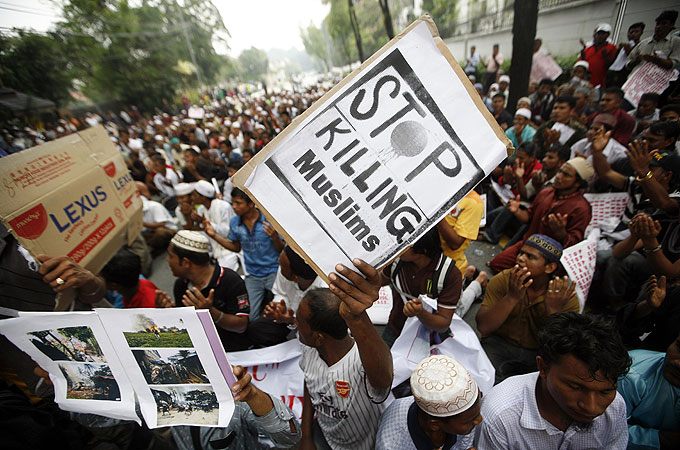Maungdaw, Arakan State: The authority display army in all part of Maungdaw to keep no violence since yesterday, said an elder from Maungdaw.
“Some army is stationed near the market of Maungdaw and other areas, some Rohingya are going to market to buy foodstuff for their home when army has taken security in the town. The army also sells rice to the Rohingya since yesterday in Maungdaw.”
“The rice sacks which Rohingya buy from army, are taking to their home, but the police personnel are collecting toll from these rice sacks.”
“The police personnel –Assistant police officer Aye htun Sein and sergeant Than Maung Gyi- stationed near the clock tower and collecting toll from Rohingya who return from Maungdaw market.”
“The security personnel collect 1000 kyats per sack of rice who take for his home and sometimes the security personnel hijacked Rohingya who has money. The police personnel take him to the electric generator compound and toke all the belonging from Rohingya.”
If the armies also take position at clock tower, the Rohingya will able to move freely from this area, said a school teacher.
“Suddenly, the authorities change their plan of no foods for Rohingya is a showcase to prove the visiting UN Human Rights Special Rapporteur, Tomas Ojea Quintana .”
The authority also preparing to kept fake Rakhine refugees in the refugee centers in Maungdaw to show the difficulty of Rakhine community in Maungdaw. Actually, the Rohingya community is refugees as IDPs in their villages and not getting foods and medicines as they lost everything during the riot.
The UN Human Rights Special Rapporteur, Tomas Ojea Quintana wish to find out the real facts, he must meet the Rohingya from villages or must visit Rohingya villages if he had times to see the Rohingya life after riot in Maungdaw, said an elder from Maungdaw.
“The authority will give to meet him with some Rohingya who are the puppet of authority.”
“We have been receiving a stream of reports from independent sources alleging discriminatory and arbitrary responses by security forces, and even their instigation of and involvement in clashes,” the UN High Commissioner for Human Rights, Navi Pillay, said in a news release stated in UN.org website.
“Reports indicate that the initial swift response of the authorities to the communal violence may have turned into a crackdown targeting Muslims, in particular members of the Rohingya [Muslim] community,” she added.
Ms. Pillay welcomed the Special Rapporteur’s visit, but noted that “while he will be able to make an initial assessment during his one-day visit, this is no substitute for a fully-fledged independent investigation.”




